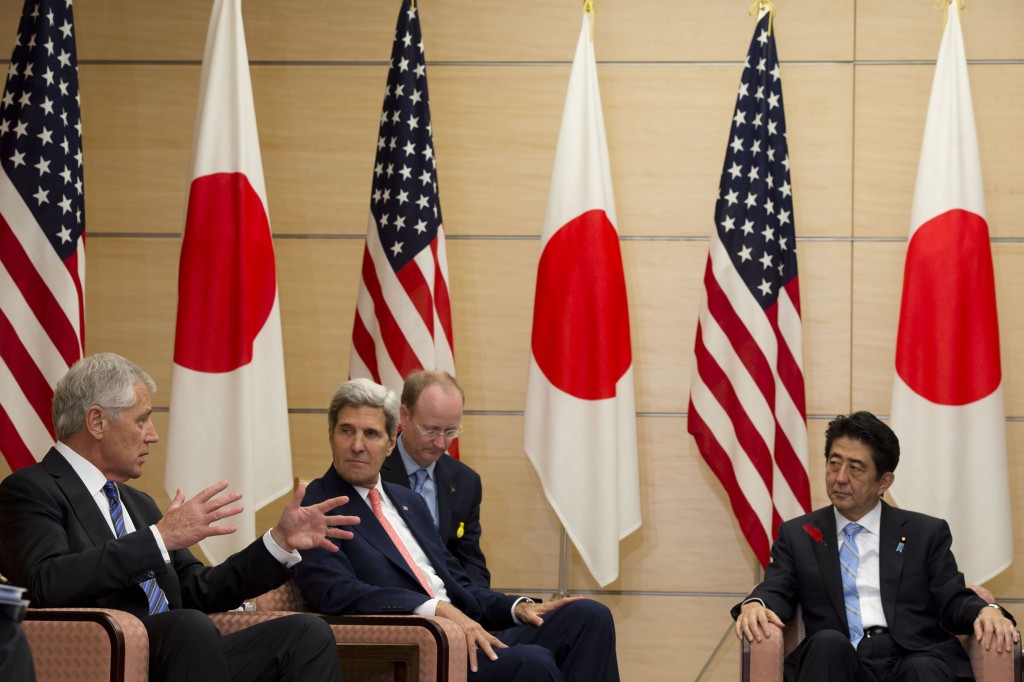
The U.S. has just announced a deal with Japan that will allow basing rights for surveillance drones. Oh and the Pentagon swears their purpose is to surveil North Korea. Really, they promise. China? What’s a China?
“The primary mission for the Global Hawks will be to fly near North Korea, where U.S. officials hope they will greatly enhance the current spying capabilities,” reports the Washington Post. Maybe – perhaps – an unintended side benefit to the drone missions will be to coordinate with Japan on ” the movements of Chinese ships in the vicinity.”
You can bet Beijing won’t see North Korea as the primary target for the U.S. spy drones. In recent weeks, the Japanese Defense Ministry has indicated a strong interest in obtaining drones for themselves in order to spy on and respond to Chinese military movements in and around the disputed maritime territory of the Senkaku/Diayou islands, currently the most intense point of tension between Japan and China.
Immediately following these indications, Secretary of State John Kerry and Secretary of Defense Chuck Hagel visit with their Japanese counterparts and secure a deal to allow the U.S. to base its own drones on Japanese territory and take care Japanese defense for them. It’s a win for the U.S. in that it mitigates the Japanese desire to obtain its own drones, a privileged capability that gives the U.S. an edge, and it maintains U.S. military autonomy in Japan at a time when tensions with China have influenced Tokyo towards beefing up its long-dormant national security state.
But it’s not exactly a win for regional security. The U.S. has been antagonizing China by militarily encircling the rising Asian power and reaffirming defense agreements with all of China’s neighboring rivals, Japan foremost among them. A new scheme to increase spying on Chinese military movements in its own backyard is not going to go over well with Beijing.
“The presence of Global Hawks in East Asia is sure to irritate China, which has become increasingly vocal in pushing back against the U.S. military presence in the region,” the Washington Post reports. “Officials in Beijing had criticized Tokyo in recent days for reports that the Japanese military was considering acquiring its own Global Hawks, saying the introduction of the drones could escalate tensions.”
U.S. policy could easily exacerbate Sino-Japanese tensions and prompt a very dangerous escalation. “My biggest fear is that a small mishap is going to blow up into something much bigger,” says Elizabeth C. Economy of the Council on Foreign Relations.
“If there is a use of force between Japan and China,” warns Sheila A. Smith, also of CFR, “this could be all-out conflict between these two Asian giants. And as a treaty ally of Japan, it will automatically involve the United States.”
And for what? To contain China’s increasing global power? The U.S. can’t stop that train, which is fueled by their growing economy and increased defense budgets, short of all-out war.
Really, the U.S. should just mind its own business instead of trying to dictate China’s behavior in a desperate attempt to hold on to world hegemony.
Micah Zenko, a fellow at the Council on Foreign Relations, provides the following anecdote to sum up the hypcritical U.S. position on China:
Secretary of Defense Chuck Hagel declared at the Shangri-La Dialogue in Singapore earlier this year, “The United States stands firmly against any coercive attempts to alter the status quo.” Similarly, Hagel’s deputy, Ashton Carter, noted in reference to the Asia-Pacific, “We oppose provocation. We oppose coercion. We oppose the use of force,” adding a U.S. preference for “peaceful resolution of disputes in a manner consistent with international law.” Of course, resorting to coercion and the use of force to change the status quo are defining characteristics of U.S. foreign policy, and — as the reactions to Syria demonstrate — they are widely embraced among pundits and officials. The defining questions of East Asian relations in the coming decades is whether China emulates the U.S. military by embracing coercion, or follows U.S. guidelines as to how local disputes should be resolved.
Do as we say, not as we do. Follow our orders, or prepare for aggression.
Not exactly a constructive approach.
Update: In a piece entitled “New U.S. Drone Base is America’s Latest Move to Contain China,” John Reed at Foreign Policy says “the bottom line is that the U.S. is prepositioning forces around China.” He also details some of the other military assets, in addition to the drones, that America is encircling China with:
The Global Hawks will be joined in Japan by two squadrons of U.S. Marine Corps MV-22 Osprey tiltrotors. An MV-22 can haul a couple dozen Marines over long distances at airplane speeds with the ability to take off and land vertically like a helicopter. Needless to say, these craft could be very useful in responding to emergencies in the Pacific, where American defense officials often lament “the tyranny of distance.”
The Marines will also station F-35B Joint Strike Fighters in Japan starting in 2017, officials announced. The Marines are following the U.S. Air Force’s lead by positioning the stealth fighters in Japan. The air service announced last year that the first overseas bases for its fleet of F-35As will be in Japan. In addition to the American F-35 squadrons, the Japanese, Australian and possibly Singaporean air forces will all fly the Joint Strike Fighter, ringing China’s southeast flank with the stealth jets.
It’s worth pointing out that the U.S. Navy will base some of its brand new P-8 Poseidon submarine and ship hunting jets in Japan starting in December. The P-8 is navalized version of Boeing’s 737 airliner equipped with sonar gear, powerful radars, torpedos and even Harpoon anti-ship missiles.
There is plenty more here. Reed also offers this map of “the sites the U.S. is considering rotating its forces in-and-out of in the Pacific.”






